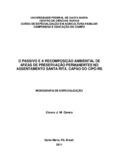| dc.contributor.advisor | Wizniewsky, José Geraldo | |
| dc.creator | Genro, Cícero João Mallmann | |
| dc.date.accessioned | 2016-07-12T14:49:38Z | |
| dc.date.available | 2016-07-12T14:49:38Z | |
| dc.date.issued | 2011-08 | |
| dc.date.submitted | 2011 | |
| dc.identifier.uri | http://repositorio.ufsm.br/handle/1/1895 | |
| dc.description | Monografia (especialização) - Universidade Federal de Santa Maria, Centro de Ciências Rurais, Curso de Especialização em Agricultura Familiar Camponesa e Educação do Campo, RS, 2011. | por |
| dc.description.abstract | This work is based on the historical context of the 25-year history and achievements
of the Movement of Landless Workers (MST in Portuguese). In this context, the
paper aims to reflect on some experiences, told by female settlers, who keep in the
resistance for space, fighting for their rights and looking for value in life. The women
in question are settled in São Pedro I, located in the metropolitan region of Porto
Alegre, more specifically in the town of Eldorado do Sul / RS. As its specific
objectives the work focuses on a) doing a theoretical review on the participation of
women in society and the Movement of Landless workers b) making a rescue on the
trajectories of the women of the settlement São Pedro I, ever since their camping in
the Farm Anoni to the present c) understanding the importance of the women's group
in question in relation to the individual and collective growth. Methodologically, the
research was based on a theoretical framework that sought to highlight and analyze
the participation of women in society, with reflections about gender, as well as the
role of women in the construction process of the country’s agrarian reform, where we
opted for a qualitative approach in which the techniques used were semi-structured
interviews done with qualified informers. As main findings and considerations it is
observed that the project of fight for land, for the agrarian reform and gender equality
need to have women as allies of the settlements, in order to be able to count on their
pedagogical action in the settlement. Nowadays, the matters of women’s rights are
very relevant in the Movement of Landless Rural Workers, it is a major breakthrough
being able to bring to light an issue so ingrained with prejudice. In this process, for
many women the movement MST, it is and it was an opportunity of liberation from
the various forms of oppression; the woman in settlements lives a process of
empowerment, seeking to be heard and having a voice, and also, a way for this to
happen is the participation of women in collective groups, discussing their
weaknesses, but also what makes them strong. | eng |
| dc.language | por | por |
| dc.publisher | Universidade Federal de Santa Maria | por |
| dc.rights | Acesso Aberto | por |
| dc.subject | MST (Movimento dos Trabalhadores Rurais Sem Terra) | por |
| dc.subject | Reforma agrária | por |
| dc.subject | Capão do Cipó | por |
| dc.subject | Área de preservação permanente | por |
| dc.title | O passivo e a recomposição ambiental de áreas de preservação permanente no assentamento Santa Rita, Capão do Cipó - RS | por |
| dc.title.alternative | The environmental restoration liabilities and preservation of areas of permanent settlement in Santa Rita, Capão do Cipó - RS | eng |
| dc.type | Trabalho de Conclusão de Curso de Especialização | por |
| dc.degree.local | Santa Maria, RS, Brasil. | por |
| dc.degree.specialization | Agricultura Familiar Camponesa e Educação do Campo | por |
| dc.description.resumo | O Instituto Nacional de Colonização e Reforma Agrária, oportunizou a criação de
assentamentos rurais no município de Capão do Cipó - RS, transformando a
situação sócio-econômica regional. Parte desses assentamentos encontra-se em
claro estado de devastação ambiental, utilizando inadequadamente Áreas de
Preservação Permanente (APPs), a inexistência de Reserva Legal (RL), alta taxa de
degradação do solo, o que tem refletido sensivelmente em seu respectivo
desenvolvimento desses assentamentos.O objetivo desta pesquisa é distinguir a
adequação ambiental do assentamento Santa Rita frente à legislação vigente.
Relatando as ações, participações, negociações, implantações, ocorridas entre os
atores sociais participantes, para tanto, será revelado às formas de construção de
um plano de compensação ambiental no assentamento Santa Rita. Através de
arrolamentos e revisões bibliográficas referentes à diferenciação da questão
ambiental nos assentamentos da reforma agrária, utilizando-se do Relatório
Ambiental do Instituto Nacional de Reforma Agrária do Rio Grande do Sul, Plano de
Ação Ambiental do INCRA. Relatando na organização, participação em reuniões,
capacitações, visitas técnicas, realizadas pela equipe Programa TERRASOL-INCRARS
/UFSM/SOMAR e relatos da Assessoria Técnica, Social e Ambiental (ATES)
local, com os assentados e coordenação do assentamento, realizou-se então,
registros fotográficos, vídeos das referidas reuniões de construção do plano de
compensação ambiental do assentamento Santa Rita. | por |
| dc.publisher.unidade | Centro de Ciências Rurais | por |


